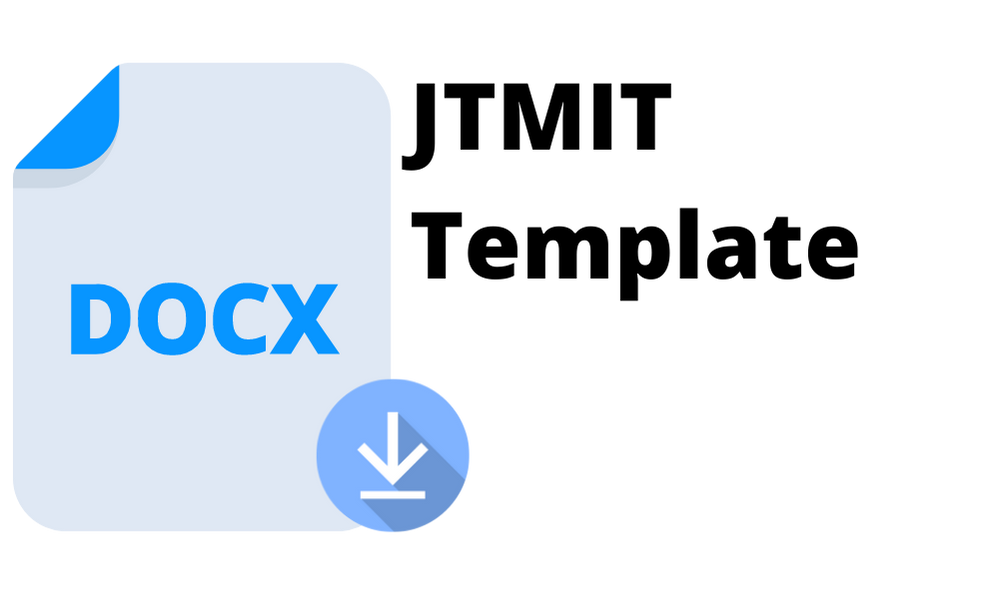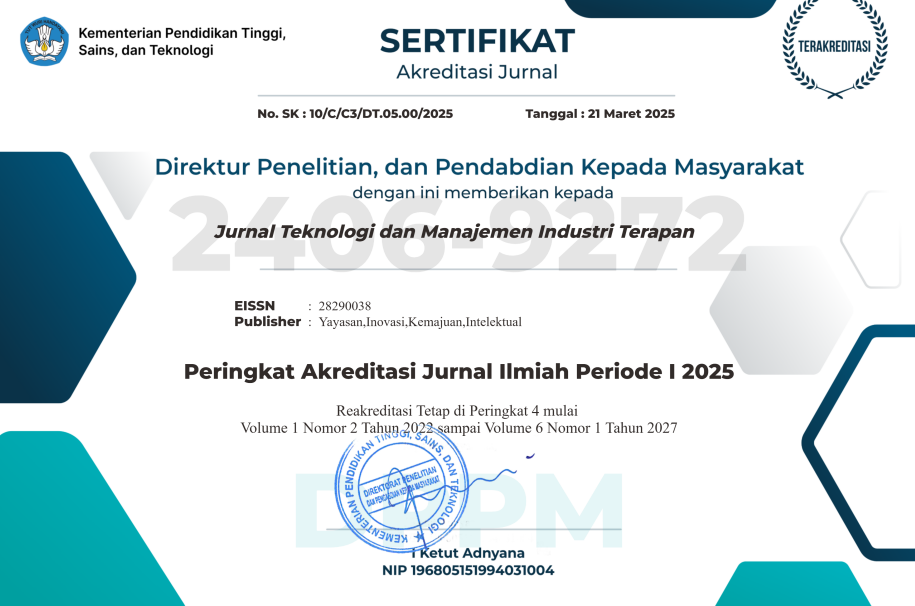The Influence of Digital Literacy on Employee Performance with Work Ethic as a Moderating Variable
DOI:
https://doi.org/10.55826/jtmit.v4iI.1123Keywords:
Digital Literacy, Work Life Balance, Work Ethic, Employee PerformanceAbstract
This research is a quantitative research with an explanatory approach, namely an approach that has a strong relationship with previous studies, such as siblings, to create, modify, and prove the hypothesis in this article. The data used in this study is primary data that the researcher obtained from an online questionnaire distributed to two hundred and eighty-five employees of “Mitra Sepuluh” Company, spread throughout Indonesia. The data that the researcher obtained was analyzed using the smart PLS 4.0 analysis tool. The conclusion in this article shows that the Digital Literacy variable has a positive relationship direction and a significant influence on Employee Performance in the first hypothesis. This is because the P-values in this article are positive and below the 0.05 significance level, namely 0.016. These results mean that the better digital literacy possessed by an employee can make employees smarter, make it easier for them to complete tasks for the company, and ultimately improve employee performance. In the next hypothesis, the Work Ethic variable can also moderate the influence of the Digital Literacy variable on Employee Performance because the same thing is that the P-Values are positive and below the 0.05 significance level, namely 0.000, more significant than the direct test of 0.000. Thus, it can be concluded that the first and second hypotheses in this article can be accepted and proven
References
A. Subarno, “Optimalisasi Penerapan Quick Response Code Indonesia Standard (Qris) Pada Merchant Di Wilayah Surakarta,” J. Inf. Dan Komun. Adm. Perkantoran, Vol. 5, No. 2, Pp. 43–57, 2021.
R. Setyaningsih, A. Abdullah, E. Prihantoro, And H. Hustinawaty, “Model Penguatan Literasi Digital Melalui Pemanfaatan E-Learning,” J. Aspikom, Vol. 3, No. 6, P. 1200, 2019, Doi: 10.24329/Aspikom.V3i6.333.
S. Stefany, “Literasi Digital Dan Pembukaan Diri : Studi Korelasi Penggunaan Media Sosial Pada Pelajar Remaja Di Kota Medan Magister,” Jurnail Pemikir. Dan Penelit. Sosiolog, Vol. 2, No. 1, Pp. 10–31, 2017.
E. T. Kurniawati, I. Zuhroh, And N. Malik, “Literasi Dan Edukasi Pembayaran Non Tunai Melalui Aplikasi Qr Code Indonesian Standard (Qris) Pada Kelompok Milenial,” Stud. Kasus Inov. Ekon., Vol. 05, No. 01, Pp. 23–30, 2021.
D. A. R. Widyastuti, “Literasi Digital Pada Perempuan Pelaku Usaha Produktif Di Daerah Istimewa Yogyakarta,” J. Aspikom, Vol. 3, No. 1, Pp. 1–15, 2016.
Rahayu. R, “Analisis Faktor-Faktor Yang Mempengaruhi Tingkat Literasi Keuangan Digital- Studi Pada Generasi Z Di Indonesia ,” Reviu Akunt. Dan Bisnis Indones., Vol. 6, No. 1, Pp. 73–87, 2022, Doi: 10.18196/Rabin.V6i1.142682.
I. Tiffani, “Pengaruh Literasi Keuangan Dan Literasi Digital Terhadap Preferensi Bank Digital,” Mbia, Vol. 22, No. 1, Pp. 152–167, 2023, Doi: 10.33557/Mbia.V22i1.2039.
N. Atifa, “Pengaruh Literasi Pajak, Sosialisasi Perpajakan, Dan Pemanfaatan Financial Technology Terhadap Kepatuhan Wajib Pajak Dimana Digitalisasi Perpajakan Sebagai Variabel Moderasi,” Universitas Islam Malang, 2023.
P. Limilia And N. Aristi, “Literasi Media Dan Digital Di Indonesia: Sebuah Tinjauan Sistematis,” J. Komun., Vol. 8, No. 2, Pp. 205–222, 2019, Doi: 10.33508/Jk.V8i2.2199.
M. Huda And F. Farhan, “Pengaruh Budaya Organisasional Dan Komitmen Organisasional,” J. Manaj. Motiv., Vol. 15, No. 2, P. 62, 2019, Doi: 10.29406/Jmm.V15i2.1557.
D. Winda Meidina And Dan S. Netty Laura, “The Effect Of Employees’ Mental Health On Performance Mediated By Welfare In The Workplace (Empirical Study On Information Technology Division Employees During Work From Home,” Bus. Manag. J., Vol. 18, No. 1, Pp. 85–105, 2022, Doi: 10.30813/Bmj.
A. P. Mangkunegara, Evaluasi Kinerja Sumber Daya Manusia. Bandung: Pt Refika Aditama, 2006.
Luthans, Perilaku Organisasi (Organizational Behavior). 10th Edn. Yogyakarta: 10th Edn, 2006.
Luthans, Organization Behavior: An Evidence-Based Approach, Twelfth Edition. New York: Mcgraw-Hill, 2011.
S. Mangkuprawira, Manajemen Mutu Sumber Daya Manusia. Bogor: Penerbit Ghalia Indonesia, 2007.
A. P. Mangkunegara, Evaluasi Kinerja Sdm. Bandung: Refika Aditama, 2013.
Marwansyah, Manajemen Sumber Daya Manusia. Bandung: Alfabeta, 2012.
N. Erman And A. Fahroby, “Pengaruh Gaya Kepemimpinan Terhadap Kinerja Karyawan Pada Pt. Rusindo Expertiza Inspekciya Pekanbaru,” Institut Agama Islam Negeri Surakarta, 2022. [Online]. Available: Https://Jurnal.Institute-Ehmri.Ac.Id/Index.Php/Mapan/Article/View/108%0ahttps://Jurnal.Institute-Ehmri.Ac.Id/Index.Php/Mapan/Article/Download/108/85
Andi Eko Prasetyo, “Pengaruh Budaya Kerja Terhadap Perilaku Kerja Dan Kinerja Karyawan Pada Pt. Bank Pembangunan Daerah (Bpd) Banyuwangi,” Universitas Jember, 2011.
D. Hamid, “Pengaruh Kompensasi Terhadap Komitmen Organisasional Dan Kinerja Pegawai ( Studi Pada Pegawai Tetap Pg Kebon Agung Malang,” J. Adm. Bisnis, Vol. 38, No. 2, Pp. 79–88, 2016, [Online]. Available: Https://Www.Academia.Edu/Download/56005967/1512-6151-1-Pb_Jurnal_Matrik_Persamaan_Job_Satisfaction.Pdf
T. Supriatna, D. Juhandi, And R. Rasipan, “Promosi Media Sosial Dan Literasi Digital Terhadap Kinerja Pemasaran Yang Di Moderasi Akses Fasilitas Digital,” Master J. Manaj. Strateg. Kewirausahaan, Vol. 2, No. 2, Pp. 167–178, 2022, Doi: 10.37366/Master.V2i2.481.
V. S. Ramadhan, “Pengaruh Digital Literacy Dan Transformational Leadership Terhadap Kinerja Karyawan Melalui Motivasi Kerja (Studi Pada Pt Nusa Palapa Gemilang Cabang Jemursari Surabaya),” Universitas Brawijaya, 2021. [Online]. Available: Https://Repository.Ub.Ac.Id/Id/Eprint/198407/
Y. Dahman, “Peran Literasi Digital, Motivasi Kerja, Kemampuan Kerja Dalam Meningkatkan Kinerja Karyawan Umkm,” Jesya, Vol. 6, No. 2, Pp. 1784–1793, 2023, Doi: 10.36778/Jesya.V6i2.1191.
S. Abdurahman, Metodologi Penelitian. Jakarta: Sinar Grafika, 2016.
Jonathan Sarwono, Meode Penelitian Kualitatif Dan Kuantitatif. Bandung: Graha Ilmu, 2016.
I. Ghozali, Aplikasi Analisis Multivariete Dengan Program (Ibm. Spss). Diponergoro: Univrsitas Dipenogoro, 2016.
Hair, Multivariate Data Analysis, Seventh Editions. Prentice Hall: New Jersey, 2010.
M. Sarstedt, C. M. Ringle, D. Smith, R. Reams, And J. F. Hair Jr, “Partial Least Squares Structural Equation Modeling (Pls-Sem): A Useful Tool For Family Business Researchers,” J. Fam. Bus. Strateg., Vol. 5, No. 1, Pp. 105–115, Mar. 2014.
Downloads
Published
Issue
Section
License
Copyright (c) 2025 Murni Yanto

This work is licensed under a Creative Commons Attribution-NonCommercial-ShareAlike 4.0 International License.


















